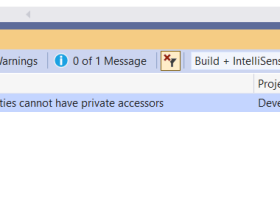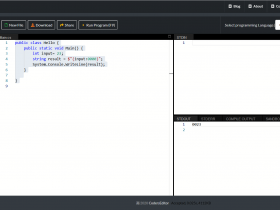Using Implicit Method Group Conversion in C#
This post will explain what exactly is Implicit Method Group Conversion and how to use them in your C# application.
Its great to learn something new everyday that keeps me updated in .NET which always makes me feel fresh . With every topic that i come across everyday , it make me feel that i am still a fresher .
Today , i got to know something about Implicit Method Group Conversion in C# .
Well , if you are still looking to know whet it is , the example below will clearly explain you this .
Assume that the List contains the Names Senthil Kumar,Developer,Trivium like below.
List<string> LstNames = new List<string>();
LstNames.Add("Senthil Kumar");
LstNames.Add("Developer");
LstNames.Add("Trivium");How will you display the Names in the list ?
Most Developers (including me ) will end up doing something like this .
foreach (string str in LstNames)
{
Console.WriteLine(str);
}or
for (int i = 0; i < LstNames.Count ; i++)
{
Console.WriteLine(LstNames[i]);
}Now , the same can be achieved with just one line of code .
LstNames.ForEach(str => Console.WriteLine(str));
Further , i can remove the lambda expression and display the same names with the Implicit Method Group Conversion like below
LstNames.ForEach(Console.WriteLine);
This results in the same output as the one as above.
List<string> LstNames = new List<string>();
LstNames.Add("Senthil Kumar");
LstNames.Add("Developer");
LstNames.Add("Trivium");
LstNames.ForEach(Console.WriteLine);




Oh it’s really great knowledge sharing. Thanks 🙂
You have error in post:
Correct variant:
for (int i = 0; i < LstNames.Count; i++)
{
Console.WriteLine(LstNames[i]);
}
or
for (int i = 0; i <= LstNames.Count – 1; i++)
{
Console.WriteLine(LstNames[i]);
}
Error .. i dont see anything… Did you mean usage of foreach ??
your example:
List LstNames = new List();
LstNames.Add(“Senthil Kumar”);
LstNames.Add(“Developer”);
LstNames.Add(“Trivium”);
for (int i = 0; i < LstNames.Count – 1; i++)
{
Console.WriteLine(LstNames[i]);
}
Result:
Senthil Kumar
Developer
Missing: Trivium
The correct iteration of list is:
for (int i = 0; i < LstNames.Count; i++)
{
Console.WriteLine(LstNames[i]);
}
Thanks Ryukk , i have updated it .